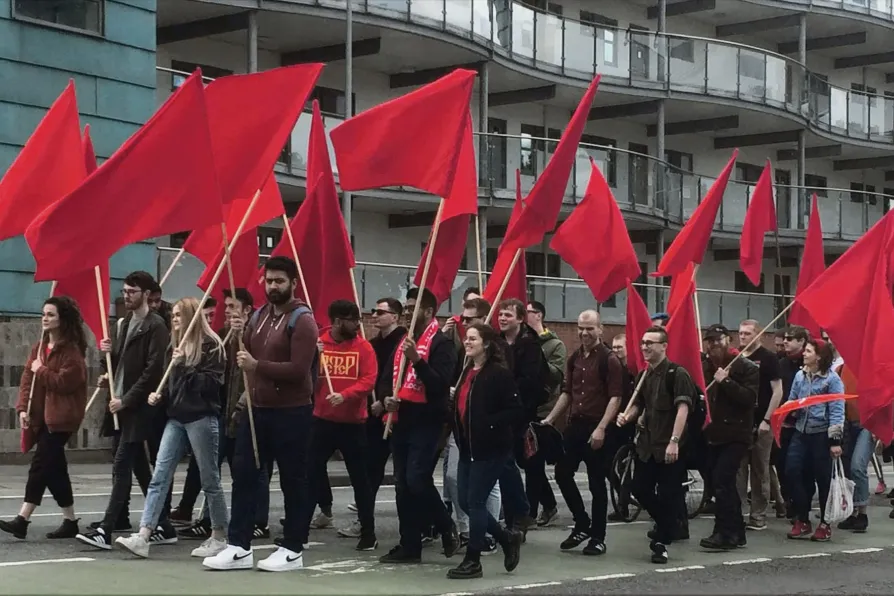In the land of white supremacy, colonialism and the foul legacy of the KKK, JOHN WIGHT knows that to resist the fascism unleashed by Trump is to do God’s work


MANCHESTER remained the largest Labour group in the country last week, with 93 of 96 seats. Even on a rather poor night for the party nationally, the Liberals were confined to a single ward. That was West Didsbury, successor to the Didsbury Ward of Manchester’s last elected Tory councillor, Peter Hilton, who finally left the town hall in 1996.
Even more worrying perhaps for those that imagine a Liberal revival in the city of Bright and Cobden, they only came second in a further seven wards. Rather, it was the Manchester Green Party who were runners up in 13 of the city’s 32 wards despite having almost none of the campaign architecture of the other parties.
Further, the closest margin of the night came not from Manchester’s erstwhile opposition, but from Independent Ken Dobson in the staunchly working class Clayton & Openshaw division, where he ran Labour’s Sean McHale within a dozen votes.
There are therefore three key lessons on the ground for Manchester politics.
The first, that even four years after the coalition, the Liberal brand remains utterly toxic in Manchester. If that party cannot win relatively wealthy, heavily Remain-voting areas on its best night nationally for decades, with a complete absence of Conservative competition for those voters, then it is difficult to see where they go from here. The stench of Conservative collaboration continues to surround the party, and it is difficult to imagine that dissipating while it is led by John Leech, the man who voted for every Osborne Budget as the former MP. And yet Mr Leech’s iron grip and unquestionable work ethic is perhaps the only thing that keeps the Liberals in Manchester alive. Whether the new generation can lead the party out of his shadow remains to be seen.
The second lesson is that the future challenge to Labour will not come from the opportunist right but from the environmental left. A glance through the Manchester Green Party’s manifesto showed little that a Labour member would disagree with, and crucially none of the vitriol which has marred Manchester’s politics for years. As the salience of environmental issues continues to grow, it seems only a matter of time until, somewhere, a three way split produces a Green councillor.
[[{"fid":"13140","view_mode":"inlinefull","fields":{"format":"inlinefull","field_file_image_alt_text[und][0][value]":false},"type":"media","field_deltas":{"1":{"format":"inlinefull","field_file_image_alt_text[und][0][value]":false}},"link_text":null,"attributes":{"height":"1220","width":"660","class":"media-element file-inlinefull","data-delta":"1"}}]]
What that will do to the mechanics of the town hall is unknown. Hulme ward briefly sent a Green to the town hall without much fuss earlier in the century, yet the sense now is of a more profound shift. How to head this off will be a key subject for the city’s leadership. Embracing the calls for greater public housing, municipalisation of transport, insourcing, pollution controls and more truly public spaces for leisure are things we should be pursuing anyway. Yet the fate of Manchester Airport, indispensable as it is to the city’s finances and providing thousands of unionised jobs, may well be the flashpoint.
The third lesson, from the city’s east and north however, is that not even Manchester is entirely immune to the new parochialism that is sweeping Britain’s towns. Both in Ukip and the rise of the Independents, which Jen Williams has written about extensively, those working-class communities that must be at the heart of a true party of labour have sought other options, the biggest of which is simply not voting at all.
It had been thought that the strength of the Mancunian identity would prevent this, and indeed broadly that is the case. Yet even in 2017, with Labour’s highest vote ever, the Blackley & Broughton constituency of Graham Stringer saw more people not bother to vote than vote Labour. When turnouts are low, it doesn’t take much for the scales to tip wildly. The party cannot, and must not, take the north for granted.
Which, perhaps, is the final message to the party nationally. Do not take us for granted. For all the concerns noted above, Manchester Labour has held together a hugely diverse city that contains some of the most deprived wards in Britain during a decade of austerity. It is far from perfect, and the generational shift within the party locally over the next few years will overthrow some old orthodoxies.
But through relentless hard graft it has remained the keystone of the central belt of Britain, that trail of electoral red running from the Wirral to West Yorkshire. And if the Labour Party truly wants to break the view it is a London-dominated party, it could do worse than move its headquarters to the banks of the Irwell. We promise to make it a proper homecoming.

SAM WHEELER applauds a visceral, thoughtful interrogation of radicalisation and national identity in contemporary Britain

















